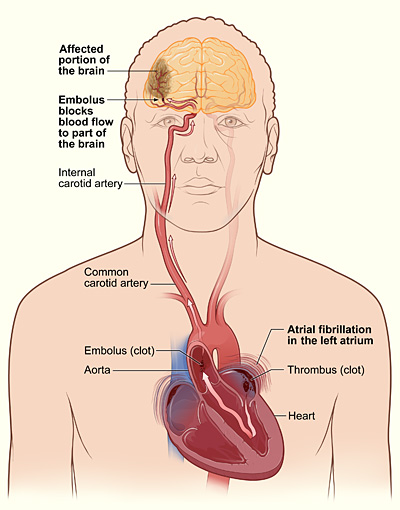Atrial fibrillation (AF or AFib) is the most common type of treated heart arrhythmia and can happen to anyone. An arrhythmia is when the heart beats too slowly, too fast, or in an irregular way.
The heart’s upper chambers (atria) beat out of coordination with the lower chambers (ventricles). When this happens, the lower chambers do not fill completely or pump enough blood to your lungs and body.
Symptoms
You may not know you have AFib because you may not experience any symptoms. Others may experience any of the following:
- Heart palpitations (rapid, fluttering, or pounding)
- Irregular heartbeat
- Shortness of breath
- Extreme Fatigue
- Lightheadedness or dizziness
- Chest pain
- Inability to exercise or weakness
Risk Factors
 The risk for AFib increase with age. When your heart tissue or electrical signaling is damaged the heart muscle can pump fast and irregular. Most often the cause of damage is high blood pressure and coronary heart disease. There are other factors that may put you at risk for AFib.
The risk for AFib increase with age. When your heart tissue or electrical signaling is damaged the heart muscle can pump fast and irregular. Most often the cause of damage is high blood pressure and coronary heart disease. There are other factors that may put you at risk for AFib.
Risk factors include:
- Age – The risk increases as you age, especially after age 65.
- Family history – If someone in your family as had atrial fibrillation, you have a higher risk of developing it.
- High blood pressure – Accounts for about 20% of cases of AFib
- Diabetes
- Heart failure
- Ischemic heart disease
- Hyperthyroidism
- Chronic kidney disease
- Enlargement of chambers on the left side of the heart
- European ancestry
- Obesity
- Lack of physical activity – Moderate physical activity may have a protective effect and is linked to a lower risk of atrial fibrillation
- Smoking – Smoking increases the risk of AFIB. The appears to be higher the longer your smoke and decreases if you quit. Secondhand smoke exposure increases risk of developing atrial fibrillation
- Moderate to heavy alcohol use – Consumption in large amounts, especially binge drinking can put you at a higher risk for AFib. Even modest amounts can trigger AFib in some people
- Illegal drug use – Cocaine and other street drugs can trigger or make AFib worse.
Treatment AFib
Sometimes atrial fibrillation goes away on its own. For some people, atrial fibrillation is an ongoing heart problem that lasts for years. Over time, it may happen more often and last longer. Treatment restores normal heart rhythms, helps control symptoms, and prevents complications. Your doctor may recommend medicines, medical procedures, and lifestyle changes to treat your atrial fibrillation.
-
Medical/Non-Surgical Procedures
- Cardioversion – Using electrical shocks to restore normal heart rhythm in people with irregular heartbeats.
- Catheter ablation – Using electrical energy to remove abnormal tissue. For example, in the heart to restore a regular heartbeat.
-
Medications
- Beta blocker – Slows heart rate and decreases blood pressure. When taken in eye-drop form, it reduces eye pressure
- Calcium channel blocker – Relaxes blood vessels
- Antiarrhythmic – Helps control abnormal or irregular heart rhythms
- Anticoagulant – Unwanted reactions from taking drugs that inhibit blood clotting. The most frequent problem is too much bleeding, which can be serious.
-
 Surgery
Surgery- Cox maze procedure – Heart surgery where small cuts create a planned “maze” of scar tissue. The maze guides electrical signals, restoring a regular heartbeat
- Mini maze procedure – Surgery that uses a tiny camera and small cuts to create a maze of scar tissue on a beating heart. The maze guides electrical signals and restores a regular heartbeat.
-
Supportive Care
- Using an electronic device to monitor heart rate and rhythm. Can be done in the hospital or at home.
AFib increases a person’s risk for a stroke but is not a stroke. A stroke happens when blood flow to the brain is blocked by a blood clot or by fatty deposits called plaque in the blood vessel lining.
Strokes caused by complications from AFib tend to be more severe than strokes with other underlying causes. When standard stroke risks were considered, AFib was associated with an approximately fivefold increased risk of ischemic stroke. AFib causes about 17% of strokes.
Consequences of AFib
Almost ½ million hospitalizations with AFib as the primary reason happen yearly in the U.S. AFib contributes to more than 150,000 deaths a year.
Dr. Bobish
If you are experiencing any symptoms of atrial fibrillation talk to your health care team. They will determine if you need to be referred to a Cardiologist like Dr. Bobish for further testing.
Dr. Bobish and her team is here to support you and are committed to keeping you healthy and heart smart! Request an appointment at 989-448-7002


 Surgery
Surgery